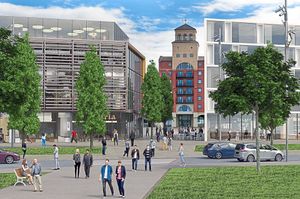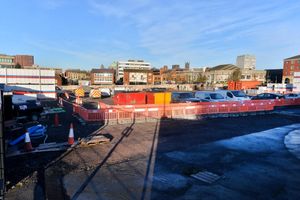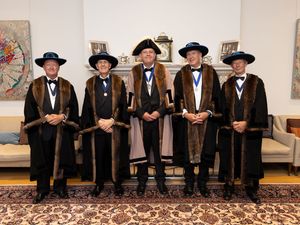Ambitious Westside plans to transform Wolverhampton replaced after years of uncertainty
Wolverhampton's flagship Westside scheme has been replaced with a new development.
The £50 million scheme – launched at the Houses of Parliament in 2016 – was set to bring a cinema, restaurants, ten-pin bowling, mini golf, a hotel and a car park to a 6.4-acre plot in the city centre.
But the plans have been shelved and replaced with a new scheme dubbed City Centre West, which includes the controversial £15.7m pedestrianisation programme on Victoria Street.
Council chiefs say talks are ongoing with operators over a new hotel, but say plans for a cinema had been hit by chains "reining in new operations".
They insist the site will be "brought forward in its entirety combining residential and leisure uses" but say the work will be completed "on a careful phased basis reflecting current market conditions and challenges".
The council also says Urban & Civic – its chosen developer for Westside – was "unable to present a viable and deliverable scheme due to market conditions and viability concerns".
Wolverhampton Council's deputy leader and economy boss, Councillor Stephen Simkins, said the authority was working closely with the Government to "maximise its commitment to investing in the city through levelling up".
He said: "The area known as City Centre West and previously referred to as Westside, is one of the council’s key land interests that is being promoted as part of the levelling up discussions.
"Works to dramatically transform this side of the city centre through its connecting public realm are on track to be completed early next year, improving the public environment, creating events spaces and supporting businesses by improving footfall."
He said the authority "remains in talks" with hotel operators over a site at the junction of Ring Road St Marks and School Street, which would support a five-year strategy to make Wolverhampton an "events city".
"Consideration over bringing a cinema to this part of the city centre remains but we recognise it is a difficult time for this sector nationally with cinema chains currently reining in new operations," he added.
"Any new developments in the city must be supported by a thorough business case and deliver value for money for the council and the taxpayer."
Urban & Civic is not involved in the current plans.
Meanwhile an announcement on the long-delayed re-opening of the Civic halls is expected this month.

What now for a plan that is so vital to the future of the city?
It was billed as the ambitious flagship scheme that would revitalise the fortunes of Wolverhampton city centre.
But Westside has now been replaced by an alternative scheme.
The £50 million development, launched to great fanfare in 2016 at the Houses of Parliament, promised a multi-screen cinema, a hotel, a multi-storey car park with 600 spaces, ten-pin bowling, adventure golf and trampolining.
It was due to cover a prominent 6.4-acre site within the city centre between Penn Road island and Salop Street – an area that had largely been left to wrack and ruin after years of neglect.
Now six years down the line council chiefs have moved on from a scheme touted as key to the future of the city and are looking at new ways to make it a reality.
Circumstances outside the council’s control have been a major factor in Westside’s failure, with the coronavirus pandemic hitting at a time when genuine progress was finally being made on the scheme.
While Wolverhampton Council has never formally announced the demise of the Westside project, bosses now talk of a new scheme around the same area of the city. They have also given it a new name – dubbing it ‘City Centre West’.
The council’s latest investment prospectus, which was first shared in May at the UK Real Estate, Investment & Infrastructure Forum in Leeds, describes City Centre West as a “new leisure opportunity” and says it is “committed to working with potential investors and developers” to bring the scheme to life.
Its features include a 600-space car park, a multi-screen cinema, family leisure attractions and restaurants – all of which formed part of the Westside scheme.
Which begs the question, how exactly does City Centre West differ from Westside?
The council wants it to include a cinema, although bosses have told the Express & Star that such a desire was unlikely to be realised due to cinema chains “reining in” new operations.
From that we can assume that the “conditional agreement” with Odeon Luxe, announced in March 2020, has now been ripped up and that no multi-screen cinema will be opening in the city centre anytime soon. Other operators are also unlikely to move in, particularly as Cineworld, which already operates at Bentley Bridge, is in financial trouble.
The elements of the original scheme that appear to still be part of the plans include a hotel, with talks said to be ongoing with an operator over a site off School Street.
The key difference with Westside may well be over how the two schemes are funded.
With Westside, attracting investment proved to be a major stumbling block from the onset.
It took until February 2019 for the council to announce the £50 million required for the scheme would be secured through the use of an annuity pension fund, procured by developer Urban & Civic.
It proved controversial and was ‘called in’ by the city’s opposition Tory group over concerns it would have to be paid off by taxpayers should Westside fail.
Asked to explain what became of the deal, a council spokesman said: “Enabling the scheme to come forward via investment from an annuity pension fund would have involved a council underwrite.
“As an option, this was always subject to rigorous due diligence and stress tests to ensure the council’s financial position was not put at risk.
“These financial tests, designed to safeguard the public purse, were unable to be satisfied due to a culmination of factors including challenges impacting the leisure sector (with numerous operators entering CVAs around the time) which were further compounded by the Covid-19 pandemic, at which point discussions with operators were put on hold as reported.
“Accordingly, there has been no financial costs to the council associated with the engagement of third-party investors.”
The spokesman added that U&C’s involvement with Westside was brought to an end in March 2021 due to the firm being “unable to present a viable and deliverable scheme for Westside due to market conditions and viability concerns”.
He added: “This reflected several factors including challenges impacting the leisure sector and increased build costs.
“Coupled with this, the planning consent for the scheme had lapsed meaning that development obligations had not been met.
“Given these challenges, the developer sought further council intervention to enable the scheme to come forward.
“In reviewing the business case for council intervention, and ensuring value for money, the council was unable to intervene within the approvals in place on the basis that public money would be put at risk.”
The spokesman added that this combined with “a lack of progress in finalising arrangements with operators”, including Odeon.
U&C, which is not involved in the new scheme, did not respond to the Express & Star’s request for a comment.
As far as City Centre West is concerned, the success of the scheme is likely to hinge on whether Government funding is forthcoming.
Under Boris Johnson’s administration, the city became a levelling up ‘trailblazer’. It brought in millions of pounds in funding and now hosts the regional headquarters for the Department for Levelling Up. It is seen as a city that ministers can deal with and that wants to embrace change.
The city has undoubtedly seen some significant developments in recent years. The revamped railway station sits at the heart of the new transport interchange, while trams should finally be running on the Metro extension in the coming weeks.
The National Brownfield Institute is up and running and will be officially opened on Friday, while the Brewers Yard and Canalside South developments are in the pipeline.
However, there is no doubt that the challenges that lie ahead are huge.
Council chiefs have been trying to attract a hotel operator to the city centre for years to no avail.
Dozens of city centre stores lie empty, including the old Beatties. The pedestrianisation works on Victoria Street – which leads down to the original Westside site – have seen some stores go out of business while others are on the brink.
There is a real danger that once complete, the route could be a “road to nowhere”, as a Tory councillor in the city once warned.
Meanwhile details of the reopening of the budget-busting Civic halls – another council project to be hit by extreme delays – are eagerly awaited.
For many, the demise of Westside has brought back memories of the city’s ill-fated Summer Row development, a major retail scheme that was scrapped in 2011 in the wake of the financial crisis.
Councillor Wendy Thompson, opposition Conservative leader on Wolverhampton Council, said residents had been badly let down by the Westside saga.
“We waited six years for the first brick to be laid for Westside and no ground was dug,” she said. “Some of the site is presently used as a building materials depot behind the boards that have been erected. You can almost see the tumble weed blowing amidst the graffiti.
“Derelict land, chaotic roadworks, an unfinished Civic Hall, and many shops to let. No wonder people are asking for more frequent buses to Telford.”

Finance continues to be a stumbling block
Financing proved to be a major stumbling block to Westside from the start.
It would be paid off over 25-30 years, in a deal procured by developer Urban & Civic.
Opposition Tory councillors voiced concerns over the plan, saying there was a “major risk” that if Westside failed taxpayers would end up footing the bill.
At the time those behind the scheme insisted the funding model was a strong one, saying it meant the pension fund would effectively own the development, with the authority having responsibility for maintaining the lettings.
However, Wolverhampton Council now says the fund was not carried forward due to concerns over the financial position it would leave the council in, especially in the light of Covid.
A spokesman for the authority said: “Enabling the scheme to come forward via investment from an annuity pension fund would have involved a council underwrite.
“As an option, this was always subject to rigorous due diligence and stress tests to ensure the council’s financial position was not put at risk.
“These financial tests, designed to safeguard the public purse, were unable to be satisfied due to a culmination of factors including challenges impacting the leisure sector (with numerous operators entering CVAs around the time) which were further compounded by the Covid-19 pandemic, at which point discussions with operators were put on hold as reported.
“Accordingly, there has been no financial costs to the council associated with the engagement of third-party investors.”
Cinema was key but has become victim of circumstance
A new cinema was considered the key element underpinning the Westside development.
From the start, council chiefs said they were following the model of towns such as Telford and Stafford, which both used a cinema to support further developments around it.
But attracting a chain to open one in Wolverhampton proved to be a difficult task, and it was not until September 2019 – more than three years after Westside was announced – that some progress was made.
In a statement to councillors, the city’s regeneration director Richard Lawrence said the authority was in “advanced negotiations with a well-known cinema company to build a new multi-screen complex”.
Radio silence followed and, with the country in the grip of the Covid pandemic in early 2021, the council revealed that talks had stalled.
Fast forward 20 months and any deal for a cinema appears to be dead in the water, with the council’s regeneration chief Councillor Steve Simkins saying: “Consideration over bringing a cinema to this part of the city centre remains but we recognise it is a difficult time for this sector nationally with cinema chains currently reining in new operations.”
Large multi-screen cinemas have been struggling for years in the face of the rise of streaming services such as Netflix and Amazon Prime, and undoubtedly their demise has been exacerbated by the pandemic.
There is no bigger example than Cineworld – a major chains with a cinema at Bentley Bridge, Wolverhampton – which is currently embroiled in a battle for survival on the back of plummeting trade.
Meanwhile the UK’s third biggest chain, Vue, has gone through a restructure. Many people in Wolverhampton also travel to nearby Dudley, where there is a Showcase sitting alongside a free car park.
It isn’t an impossible dream. Across the country there are examples of new cinemas opening as part of major developments.
In Kent last month, Curzon opened a five-screen complex as part of the £115m Riverside development in Canterbury – just as Odeon announced its city centre site was to permanently close.
It is perhaps not surprising that a recent report on the UK cinema industry suggested that while the age of the multiplex was gone, there may still be a place for smaller operations.
Hotels need to be persuaded to move in
A new hotel still remains key to regeneration plans for Wolverhampton city centre, according to council chiefs.
The authority has been desperate to bring a major chain into the city for years, with the lack of decent accommodation considered one of the key factors stopping visitors from staying in the city.
A 100-bed hotel was initially planned for Westside, but by February 2019 regeneration bosses suggested they may need to deliver the leisure part of the scheme before a hotel operator would agree to come in. Then in March 2020 council leader Ian Brookfield said he wanted to see up to four “top hotels” in the city centre – with the car park of the old Carillion site next to Molineux mooted as a potential site.
However, despite talks taking place with a number of hotel operators, a deal is yet to be struck.
It leaves the Britannia as the only sizeable hotel inside the ring road – and that is closed until May 2023 having been used to temporarily house asylum seekers.
There is light at the end of the tunnel.
According to the council, talks have been ongoing with operators since the start of this year over building a hotel at a site off School Street.
It is a widely held view that these negotiations will be significant in determining whether the council’s regeneration of the city centre is a success.
The council has launched a five-year plan to make Wolverhampton an “events city”, with the idea being that visitors stay overnight after seeing a show at the Grand or a gig at the Civic halls.
Such ambitions will rely on the city’s accommodation options being greatly improved.





